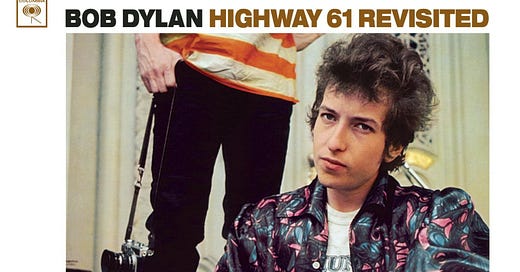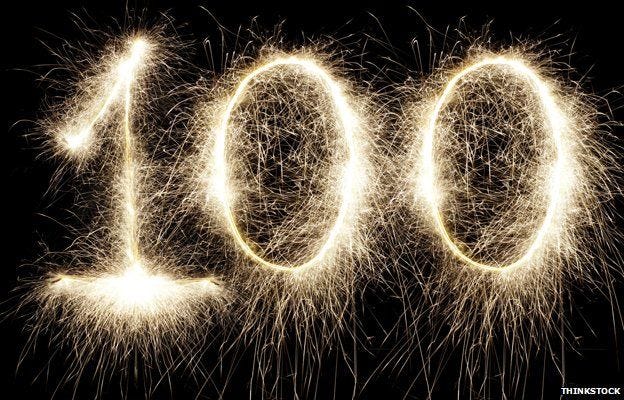At midnight all the agents and the superhuman crew come out and round up everyone that knows more than they do
Bob Dylan - 'Desolation Row' (Highway 61 Revisited - 1965)
Last Saturday, I was at The Royal Albert Hall in London to see Cat Power perform not just covers of Bob Dylan songs but a whole Dylan concert. Chan Marshall was performing the widely bootlegged and then officially released1 “Royal Albert Hall” gig, which actually took place at Manchester’s Free Trade Hall. This show was the one where a heckler, unhappy with the folk singer’s move into electric pop/rock music, shouted ‘Judas!’ at Dylan. In the first acoustic half of that show, Dylan performed songs from his yet-to-be-released album Blonde on Blonde, as well as other songs from 1965. A good chunk of this part of the set is given up the 11 minutes of Highway 61 Revisited’s closer, ‘Desolation Row’, and it is that song that we are looking at today on this, our 100th album.
If you wish to look through the other 99 entries, they can be found in the index;
Like many of the albums that we have looked at across our first hundred posts, Highway 61 Revisited, Dylan’s 9th album, ends with a song that sums up the themes explored in the rest of the album. The jugglers and the clowns from the opener ‘Like A Rolling Stone’ aren’t namechecked, but there are many characters who get a moment to shine across the song’s ten verses.
In 1969, Dylan told Rolling Stone’s Jann Wenner that he wrote the song in the back of a New York taxi, which has me wondering quite how much traffic he was stuck in, given the lyrics are so vast and sprawling that if I were to abandon the rest of this entry and simply post the lyrics, it would take you almost five minutes to read from this point.
The first attempt to record ‘Desolation Row’ was on 29/30 July 1965, and the 2005 collection Vol. 7: No Direction Home: The Soundtrack has a ‘take 1’ included with slightly different lyrics about the boiled guts of birds being fed to Casanova.2 The final version is pieced together from a couple of takes recorded in early August, with 2 August seeing Dylan and the other musicians recording thirty-seven takes of four different songs for the album.
The key difference between these takes and the finished article is the final version includes Charlie McCoy's Spanish flavour of Flamengo tinged, country flecked, guitar - McCoy would return to play on future Dylan albums Blonde on Blonde, which really elaborated on that thin, wild mercury sound and John Wesley Harding. We should also acknowledge that it doesn’t contain a piano or organ part from Al Kooper, which feature on every song on the rest of the album or his electric guitar parts that can be heard on alternate takes.
Among the many questions that Dylanologists have about his career is what or where exactly is ‘Desolation Row’? Dylan said in a press conference in late 1965 that;
Oh, that's some place in Mexico, it's across the border. It's noted for its Coke factory.
This is not the only answer Dylan has given and in they way that we expect his royal Bobness hasn’t given a straight answer in the half century he’s been fielding question on it.
There have been many ideas as to what “Desolation Row” actually is, whether a place, a group or just a figment of imagination, but the closest interpretation, without a doubt, is that Desolation Row is a state of mind achieved with cleverness and a degree of intelligence.
This is the most evident in verse 8 where it opens with the lines: “At midnight all the agents and the superhuman crew come out and round up everyone who knows more than they do” and closes with: “By insurance men who go check to see that nobody’s escaping to Desolation Row”.
The interpretation of Desolation Row being linked with intelligence can be shown in this verse alone and it may be supported with the analysis of other verses.
Al Kooper thought this alley of desolation was a section of 8th Avenue
quotes
Lyrics
Influences
Other writers - Kerouac’s Desolation Angels - already referenced on ‘Just Like Tom Thumb’s Blues’ on the album and Cannery Row by John Steinbeck. Ginsberg’s Howl
Fellini, Bleak House.
Andy Gill: venal bureaucrats, bloodless academics, loveless bourgeoisie, and the stifling oppression of the industrialised society.
Mark Polizzotti: Cowboy song about mid-Sixties America. distillation of frontier ballads, cowpoke’s laments, murderers and gamblers. Dylan blames the industrialists as much as the slogineers.
Duluth
Postcards of the hanging - a lynching in Duluth in 1920, a story Dylan heard from his father - they really did sell postcards of the hanging. seven black men
Length v contemporary
It is worth stepping back and considering just how long this song is compared to the lengths of songs produced by Dylan’s contemporaries in 1965. The Beatles’ longest song of the year was ‘Ticket to Ride’ (3:10), The Rolling Stones - ‘(I Can’t Get No) Satisfaction’ (3:43), The Beach Boys - ‘Help Me Rhonda’ (3:08), even Donavan’s ‘The Ballad of Geraldine’ doesn’t take up five minutes. They can’t even compete against Dylan’s 1965 output, excluding ‘Desolation Row’, with nine other songs topping out over five minutes, making a more apt comparison to the length of songs on another 1965 album like John Coltrane’s A Love Supreme.
Keeping up the intensity for the whole text - while it is long it doesn’t feel as long as it is.
Cast of Characters
Real, fictitious - Bleak House
MCR - Watchmen
2009 cover - line features in the comic as per the header.
Live
MTV Unplugged in 1995 and the Manchester show.
Next album, Dylan would write another epic closer, one second longer.
As The Bootleg Series Vol 4. in 1998
There are also further takes included on The Bootleg Series Vol. 12: The Cutting Edge 1965–1966 released in 2015.








A great album to reach 100 with Mitchell, I think overall this might be my favourite Dylan LP (although I do have a sneaking like for later period 'Desire'). 'Desolation Row' has always seemed an underdiscussed Dylan classic to me, so glad you've readderssed that.
Also, strangely coincidental that you've posted this just a few days after my chapter that references the Free Trade Hall 'Judas' heckle, I guess Dylan gets everywhere!
Tim - challenge69.substack.com